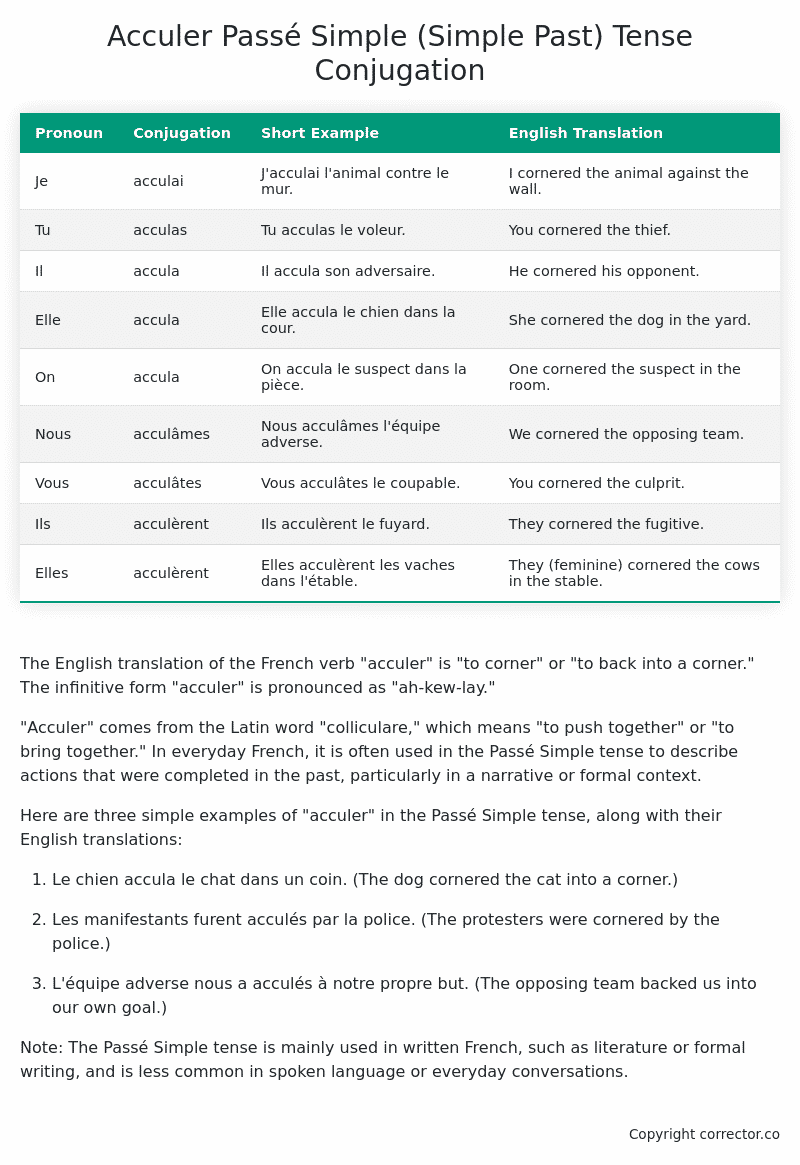Passé Simple (Simple Past) Tense Conjugation of the French Verb acculer
Introduction to the verb acculer
The English translation of the French verb “acculer” is “to corner” or “to back into a corner.” The infinitive form “acculer” is pronounced as “ah-kew-lay.”
“Acculer” comes from the Latin word “colliculare,” which means “to push together” or “to bring together.” In everyday French, it is often used in the Passé Simple tense to describe actions that were completed in the past, particularly in a narrative or formal context.
Here are three simple examples of “acculer” in the Passé Simple tense, along with their English translations:
-
Le chien accula le chat dans un coin.
(The dog cornered the cat into a corner.) -
Les manifestants furent acculés par la police.
(The protesters were cornered by the police.) -
L’équipe adverse nous a acculés à notre propre but.
(The opposing team backed us into our own goal.)
Note: The Passé Simple tense is mainly used in written French, such as literature or formal writing, and is less common in spoken language or everyday conversations.
Table of the Passé Simple (Simple Past) Tense Conjugation of acculer
| Pronoun | Conjugation | Short Example | English Translation |
|---|---|---|---|
| Je | acculai | J’acculai l’animal contre le mur. | I cornered the animal against the wall. |
| Tu | acculas | Tu acculas le voleur. | You cornered the thief. |
| Il | accula | Il accula son adversaire. | He cornered his opponent. |
| Elle | accula | Elle accula le chien dans la cour. | She cornered the dog in the yard. |
| On | accula | On accula le suspect dans la pièce. | One cornered the suspect in the room. |
| Nous | acculâmes | Nous acculâmes l’équipe adverse. | We cornered the opposing team. |
| Vous | acculâtes | Vous acculâtes le coupable. | You cornered the culprit. |
| Ils | acculèrent | Ils acculèrent le fuyard. | They cornered the fugitive. |
| Elles | acculèrent | Elles acculèrent les vaches dans l’étable. | They (feminine) cornered the cows in the stable. |
Other Conjugations for Acculer.
Le Present (Present Tense) Conjugation of the French Verb acculer
Imparfait (Imperfect) Tense Conjugation of the French Verb acculer
Passé Simple (Simple Past) Tense Conjugation of the French Verb acculer (You’re reading it right now!)
Passé Composé (Present Perfect) Tense Conjugation of the French Verb acculer
Futur Simple (Simple Future) Tense Conjugation of the French Verb acculer
Futur Proche (Near Future) Tense Conjugation of the French Verb acculer
Plus-que-parfait (Pluperfect) Tense Conjugation of the French Verb acculer
Passé Antérieur (Past Anterior) Tense Conjugation of the French Verb acculer
Futur Antérieur (Future Anterior) Tense Conjugation of the French Verb acculer
Subjonctif Présent (Subjunctive Present) Tense Conjugation of the French Verb acculer
Subjonctif Passé (Subjunctive Past) Tense Conjugation of the French Verb acculer
Subjonctif Imparfait (Subjunctive Imperfect) Tense Conjugation of the French Verb acculer
Subjonctif Plus-que-parfait (Subjunctive Pluperfect) Tense Conjugation of the French Verb acculer
Conditionnel Présent (Conditional Present) Tense Conjugation of the French Verb acculer
Conditionnel Passé (Conditional Past) Tense Conjugation of the French Verb acculer
Conditionnel Passé II (Conditional Past II) Tense Conjugation of the French Verb acculer
L’impératif Présent (Imperative Present) Tense Conjugation of the French Verb acculer
L’impératif Passé (Imperative Past) Tense Conjugation of the French Verb acculer
L’infinitif Présent (Infinitive Present) Tense Conjugation of the French Verb acculer
L’infinitif Passé (Infinitive Past) Tense Conjugation of the French Verb acculer
Le Participe Présent (Present Participle) Tense Conjugation of the French Verb acculer
Le Participe Passé (Past Participle) Tense Conjugation of the French Verb acculer
Struggling with French verbs or the language in general? Why not use our free French Grammar Checker – no registration required!
Get a FREE Download Study Sheet of this Conjugation 🔥
Simply right click the image below, click “save image” and get your free reference for the acculer Passé Simple tense conjugation!

Acculer – About the French Passé Simple (Simple Past) Tense
Formation
Usage
Narration
Historical Context
Interactions with other tenses
Passé Composé
Imparfait
Conditional and Subjunctive
Summary
I hope you enjoyed this article on the verb acculer. Still in a learning mood? Check out another TOTALLY random French verb conjugation!


